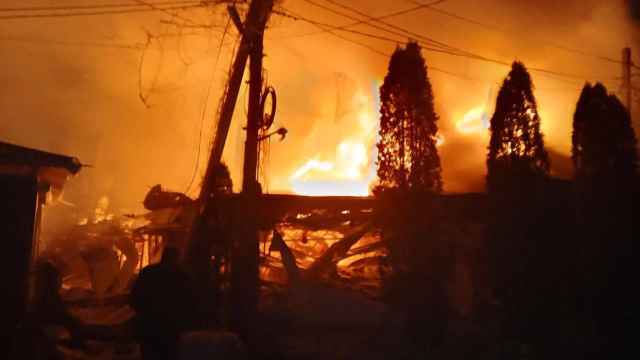Something prevented the engines of the Yak-42 jet that crashed in Yaroslavl this month from reaching full power for takeoff, the Interstate Aviation Committee on its web site Saturday.
The plane's three engines failed to switch into takeoff mode because of an "additional deceleration force," the agency said, citing preliminary data from the flight recorders.
The Yak-42 only managed to lift off 400 meters from the end of the runway, and only reached an altitude of 5 to 6 meters, it said.
The jet hit a navigational beacon and crashed into the ground, breaking apart and bursting into flames, earlier reports said.
The aviation agency did not specify what caused the deceleration force, but its statement lends weight to the theory reported by media that the pilots might have forgotten to switch off the parking brake.
The agency is analyzing what remains of the jet's braking system, and the Gromov Flight Research Institute in the Moscow region town of Zhukovsky is preparing a simulation of the crash using a similar plane, the statement said, without elaborating.
Forty-four people, including most of the players for Lokomotiv Yaroslavl, one of Russia's best ice hockey clubs, were killed in the crash on Sept. 7. Among them were players from Belarus, the Czech Republic, Germany, Lithuania, Slovakia, Sweden and Ukraine, as well as Canadian coach Brad McCrimmon. The team was flying to its Kontinental Hockey League season opener against Dinamo Minsk.
Winger Alexander Galimov survived the crash but died last Monday in the hospital. The sole survivor, crew member Alexander Sizov, remains hospitalized with burns and broken bones.
Latvian NHL veteran Karlis Skrastins, who signed for Lokomotiv in May and also died in the crash, was laid to rest in Riga on Friday. About 20,000 people came to his funeral.
A Message from The Moscow Times:
Dear readers,
We are facing unprecedented challenges. Russia's Prosecutor General's Office has designated The Moscow Times as an "undesirable" organization, criminalizing our work and putting our staff at risk of prosecution. This follows our earlier unjust labeling as a "foreign agent."
These actions are direct attempts to silence independent journalism in Russia. The authorities claim our work "discredits the decisions of the Russian leadership." We see things differently: we strive to provide accurate, unbiased reporting on Russia.
We, the journalists of The Moscow Times, refuse to be silenced. But to continue our work, we need your help.
Your support, no matter how small, makes a world of difference. If you can, please support us monthly starting from just $2. It's quick to set up, and every contribution makes a significant impact.
By supporting The Moscow Times, you're defending open, independent journalism in the face of repression. Thank you for standing with us.
Remind me later.





